Zach Rolfe trial: Body worn camera footage of Kumanjayi Walker’s final moments
Body worn video footage of the moment Kumanjayi Walker was shot dead by NT Police officer Zach Rolfe can now be legally published.
Police & Courts
Don't miss out on the headlines from Police & Courts. Followed categories will be added to My News.
SHOCKING body worn video footage of the moment Yuendumu teenager Kumanjayi Walker was shot dead by NT Police officer Zach Rolfe can now be legally published after a court ordered suppression was lifted.
The footage shows Rolfe and his Immediate Response Team colleagues entering house 511 in Yuendumu on November 9, 2019 before Rolfe fires the fatal shots, telling his partner “it’s all good, he was stabbing me, he was stabbing you”.
Rolfe has pleaded not guilty to all charges and the trial continues on Monday.
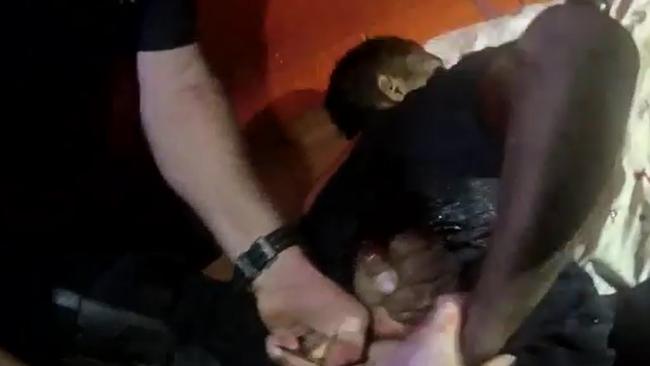
Kumanjayi Walker a suspect in series of break ins before fatal shooting, court hears
Police suspected Kumanjayi Walker may have been involved in a series of break ins that led clinic staff to evacuate from Yuendumu in the lead up to his fatal shooting, a court has heard.
Superintendent Jody Nobbs became the most senior officer to testify in the murder trial of NT Police constable Zach Rolfe on Friday, after taking the stand in the Supreme Court.
Supt Nobbs told the court it was his call to send in Rolfe’s Immediate Response Team after speaking with the officer in charge at Yuendumu, Julie Frost, on the day Rolfe allegedly shot and killed Mr Walker on November 9, 2019.
“Sergeant Frost indicated that she received a call from the clinic management within Yuendumu and they indicated to Sgt Frost their intention to evacuate the community that day on the basis of perceived safety risks,” he said.
“They asserted they were the victim of a series of unreported property crimes that preceding night, Sgt Frost suspected that Kumanjayi Walker may have been a part of that although had no definitive evidence to support that assertion.”
Supt Nobbs said Sgt Frost had requested backup due to a large funeral scheduled for that day as well as the additional burden placed on police by the loss of the medical staff.
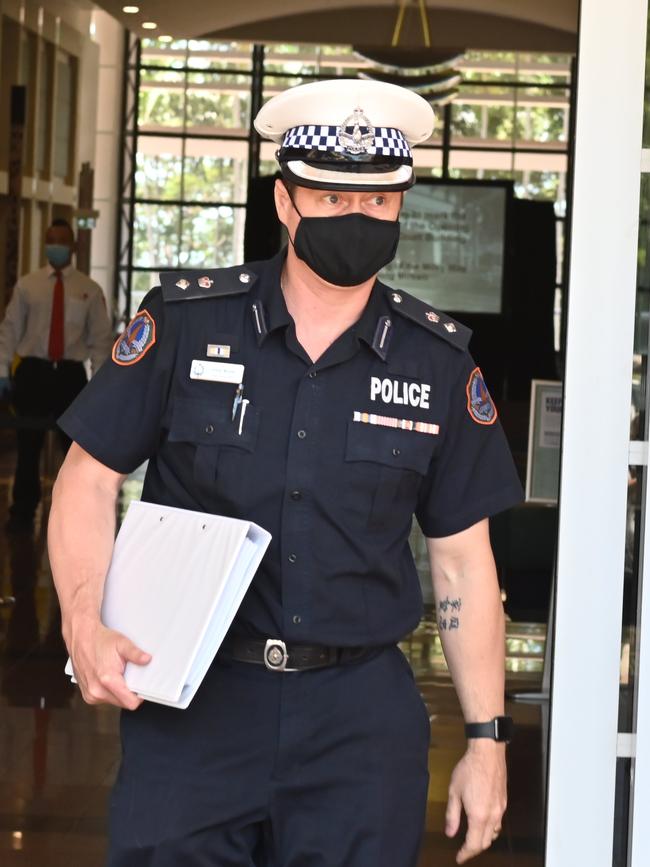
“She believed that would result in a burden on police resourcing for the period of time medical staff were absent insofar as we would receive the calls to respond to the community for not only police related matters but also medical related matters,” he said.
“She requested some additional resources be sent out from Alice Springs to not only assist with the funeral but to predominantly provide additional capability for the likely overflow of police calls.”
But Supt Nobbs said the plan was always to arrest Mr Walker after the funeral and he had still been “somewhat optimistic” he would hand himself in as per an agreement with one of his relatives.
“It was the reassurance element whereby I wanted to send police out in a general support capacity to assist the local police to reassure the community, high visibility patrolling through the course of the night, lights on, all the things that are inherent within giving reassurance and comfort to the community,” he said.
“My intention was to send out highly skilled, highly trained, highly disciplined, highly competent capability from Alice Springs that worked together frequently, recognising that not only did I have a mandate around high visibility deterrent activities but also the likely prospect, whether it was by surrender or by operational action, that there would be like an arrest post the funeral, of Kumanjayi Walker.”
Rolfe has pleaded not guilty to all charges and the trial continues on Monday.
New footage from the moments after fatal shooting released
UPDATE, THURSDAY 1PM: THE officer in charge at Yuendumu on the night Kumanjayi Walker was killed drew up a plan for Zach Rolfe’s Immediate Response Team to arrest the teenager the following morning, a court has heard.
Sergeant Julie Frost told the court her instructions to the IRT were to provide “high visibility policing” on the night of November 9, 2019 and then arrest Mr Walker at 5.30am the following day.
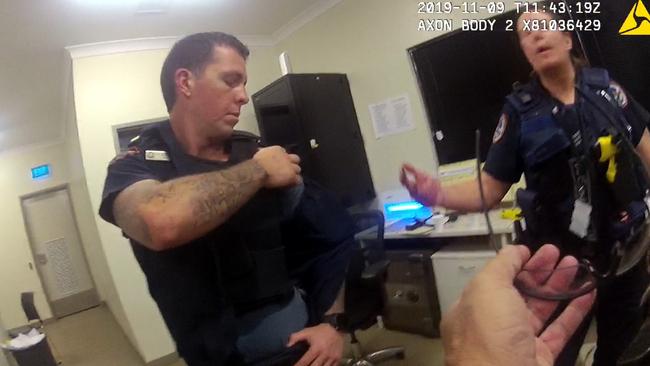
“I wanted them to drive around the community and saturate the area where a number of unlawful entries had taken place and be present in the community, that’s what I meant by ‘high visibility policing’,” she said.
“An early morning arrest like that is a far safer time to arrest people, we know that they will be sleeping and it gives the element of surprise.”
Sgt Frost said she then “took them through the events of what had been happening at Yuendumu”.
“I told them that there had been a spate of unlawful entries, there had been a number of — a lot of community unrest over at Nyirripi,” she said.
“I told them that the clinic staff had left the community. I told them that there had been a funeral and there was a ceremony afterwards that was taking place at that time.
“And we discussed Kumanjayi Walker and his history.”
But Sgt Frost said when one of the IRT officers asked what they should do if they came across Mr Walker during the patrol she said “I said ‘by all means, lock him up’”.
Rolfe has pleaded not guilty to all charges and the trial continues on Friday.
UPDATE, THURSDAY 10.30AM: FAMILY members of slain teenager Kumanjayi Walker’s partner told him to go stay with his family for his own safety after he rushed at police with an axe three days before his death, a court has heard.
Mr Walker’s partner’s grandmother, Lottie Robertson, told the Supreme Court he returned to her house after fleeing the scene on the evening of the axe incident.
“I told him for your safety, you have to go and stay with your family now,” she said.
Mrs Robertson said her husband, Eddie, told Mr Walker to go and hand himself in to police but he didn’t respond.
“He’s not a man of many words, he never spoke anything,” she said
“I told him to stop it because it was dangerous for him because he’ll get himself in big trouble.”
“He stayed with his family (after that).”
Mrs Robertson said Mr Walker had returned from Alice Springs to attend his uncle’s funeral which was held on the day of the fatal shooting but she didn’t see him there.
“If it’s going to be a big funeral, we use the hall,” she said.
“He could have been there, I don’t know, there were so many people from so many neighbouring communities.
“There was so many people that was sitting on the floors and on the mats. standing up and sitting down as well.”
The trial continues.
‘Ready to draw at a moment’s notice’: Senior cop takes the stand in Zach Rolfe murder trial
A TERRITORY cop with almost two decades experience has told a court he would have been “ready to draw at a moment’s notice” if he’d been in the situation facing Zach Rolfe in the lead up to his fatal shooting of Kumanjayi Walker.
Now acting Senior Sergeant Evan Kelly told the Supreme Court his training since joining the force in 2001 was that the appropriate response to an edged weapon was a firearm and “generally two shots will be fired and you reassess”.
Under cross examination by Rolfe’s lawyer, David Edwardson QC, on Thursday Sgt Kelly said if he had been in the other cop’s position on November 9, 2019, he would have been “ready to draw your Glock if necessary”.
“Yes, on an occasion like that, you would be prepared and ready to draw at a moment’s notice if necessary,” he said.
“Some officers will walk with their hand on their firearm, some officers don’t, it’s just a matter of personal preference, I suppose, but having your hand close to your firearm will allow for a faster draw.”
But when questioned by Crown prosecutor Joanne Poole, Sgt Kelly said he would not have removed a safety device from his Glock holster prior to drawing the weapon as prosecutors allege Rolfe had done.
“No, normally it’s one fluid action,” he said.
Rolfe has pleaded not guilty to all charges and the trial continues.
Video revealed of axe-wielding Walker
NT POLICE officer Zach Rolfe accessed a video of Kumanjayi Walker threatening fellow officers with an axe 10 times just two days before fatally shooting the 19-year-old, a court has heard.
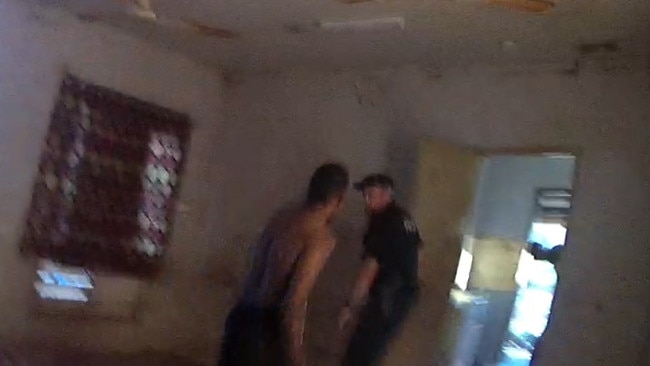
Then shift supervisor, and now detective acting Senior Sergeant, Evan Kelly, told the court he had led a patrol group to try and arrest Kumanjayi Walker on November 7, two days before the fatal shooting.
In taking the stand on Wednesday, Sgt Kelly said he and his patrol group, including Rolfe, watched the footage of the axe incident from the previous day before heading to the Warlpiri camp where they believed Mr Walker was at the time.
Sgt Kelly said while there was “a lot of chit chat and general conversation” about the footage, he could not remember anything specific Rolfe said.
“There were many comments made, but in saying that, there was also, you know, between six to 10 people there watching it at some stage,” he said.
“So specific comments, I don’t recall. Everybody was, you know, of the same opinion as me. It was a dangerous incident.”
Sgt Kelly said while he had watched the footage “on a number of occasions” himself, it was “probably less than 10”.
Rolfe has pleaded not guilty to all charges and the trial continues in the Supreme Court on Thursday.
‘A lot of it is for show’: Second officer defends decision not to draw on axe wielding Kumanjayi Walker
A SECOND police officer involved in an altercation with an axe wielding Kumanjayi Walker three days before his death has explained his decision not to draw his Glock pistol as “a combination of training and knowledge of Kumanjayi”.
Senior Constable Lanyon Smith took the stand on Wednesday in fellow officer Zach Rolfe’s murder trial over Mr Walker’s shooting death in Yuendumu in November 2019.
Const Smith, who had been stationed in Yuendumu since 2017, said he chose not to draw his weapon when confronted with the axe for a number of reasons, including the proximity of other civilians and his knowledge of Warlpiri culture.
Const Smith said Warlpiri men were known to “brandish nulla-nullas, sticks, trampoline poles” but “a lot of it is for show”.
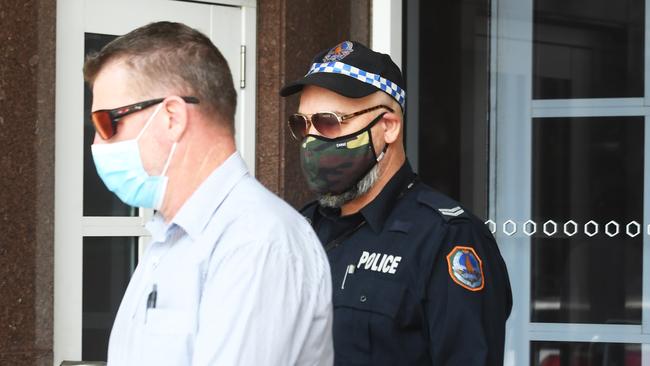
“To show ‘I would want to hurt this person but because police are here I can’t’ but in their minds, they’re trying to impress upon their family that they’re a strong person,” he said.
“Given that his partner and his mother-in-law was in the house, that’s what I was thinking also.”
But under cross examination by Rolfe’s barrister, David Edwardson QC, Const Smith agreed that had Mr Walker actually used the axe to more than threaten the officers his “response could have been quite different”.
In body worn camera footage played during cross examination, Const Smith is heard saying he was “stuck in a corner” and “begging for mercy” during the incident and he agreed with Mr Edwardson that he had seen “(his) life flashing before (his) eyes”.
Rolfe has pleaded not guilty to all charges and the trial continues.
Officer takes the stand
ONE of two police officers accosted by an axe wielding Kumanjayi Walker in a “truly terrifying experience” three days before he was fatally shot by Constable Zach Rolfe has taken the stand in his murder trial.
Senior Constable Chris Hand and his partner were tasked with arresting Mr Walker on an outstanding warrant when they confronted him at a house in Yuendumu on November 6, 2019.
Under questioning from Crown prosecutor Philip Strickland SC, Const Hand said he was armed with his police issue Glock at the time but did not remove it from its holster.
“One of the four operational safety principles with firearms is if you draw your firearm, you never want the muzzle to cover a point of anything you’re not willing to destroy,” he said.
“Also it escalates the situation, obviously we’re trying to de-escalate the situation and drawing a firearm would be escalating it and then it’s harder to de-escalate.”
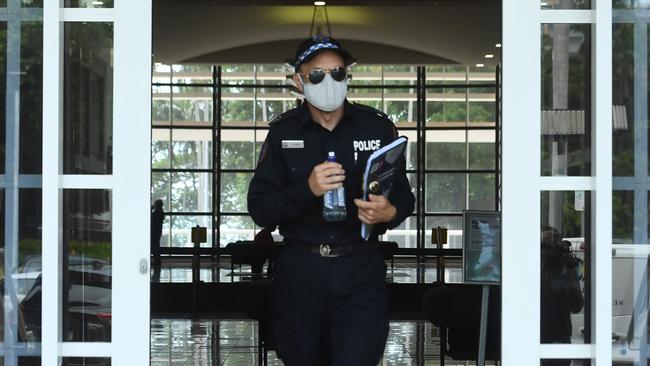
Const Hand said he had later written to NT Police Commander Travis Wurst to say “I don’t think he wanted to chop us up, he just wanted to escape” because “that’s exactly what I believe he was trying to do”.
“He had plenty of opportunity to assault us and he didn’t and he ran out of the house, didn’t want to be arrested,” he told the court.
“(We knew) where he lived and by allowing him to run out of the house we could formulate a plan later on to effect an arrest.”
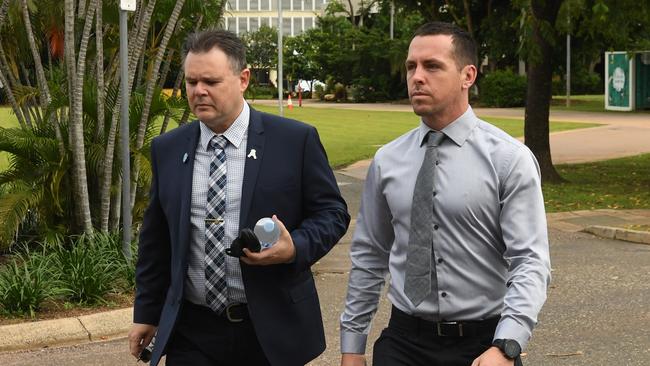
Mr Strickland asked Const Hand what the phrase “knife equals gun” meant in terms of his police training and he said it meant “you could draw your firearm if you want to”.
“Because a subject can effectively stab you with a knife quite quickly, can cover a lot of distance,” he said.
“It depends on the situation that you’re in, the person who’s holding the weapon, their intent, what you think they intend is and who else is around also.”
Under cross examination by defence barrister David Edwardson QC, Const Hand said he had not been put on notice of Mr Walker’s “predisposition for violence” and had not expected him to be armed at the time.
“So really, this was, to put it in simple terms, from your perspective at least, a fairly stock standard arrest of an Indigenous individual?” Mr Edwardson asked.
“Yes,” Constable Hand replied.
But Const Hand also agreed with Mr Edwardson that “things had changed very significantly” after the axe incident and if an offender was armed with an edged weapon and was within six metres, officers were “entitled to pull your firearm”.
“And if you pull your firearm, you’ve got to be prepared to pull the trigger?” Mr Edwardson asked.
“You’re taught to shoot to the centre mass of the body? You want to (incapacitate) the threat, stop them in their tracks?”
“Yes,” Const Hand replied.
Rolfe has pleaded not guilty to all charges and the trial continues.
Court releases pictures
WEDNESDAY, 9AM: PICTURES from the Zach Rolfe trial have been distributed to media.
They show the scissors used, and the damage they inflicted.
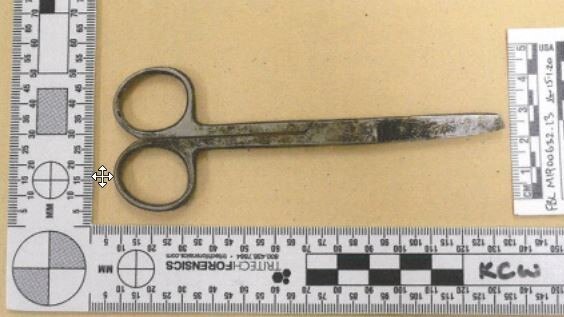
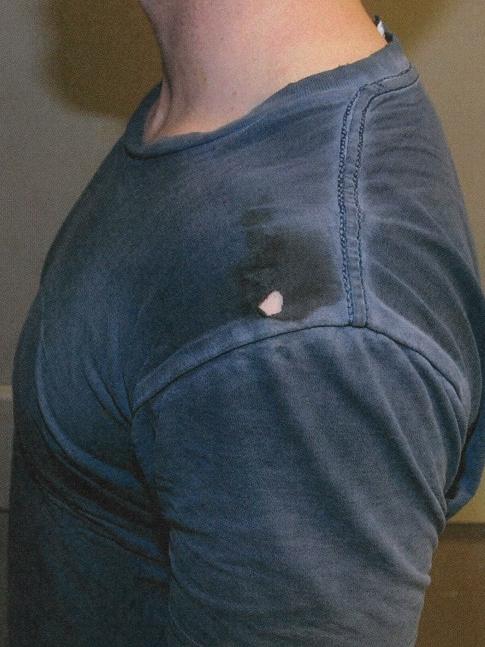
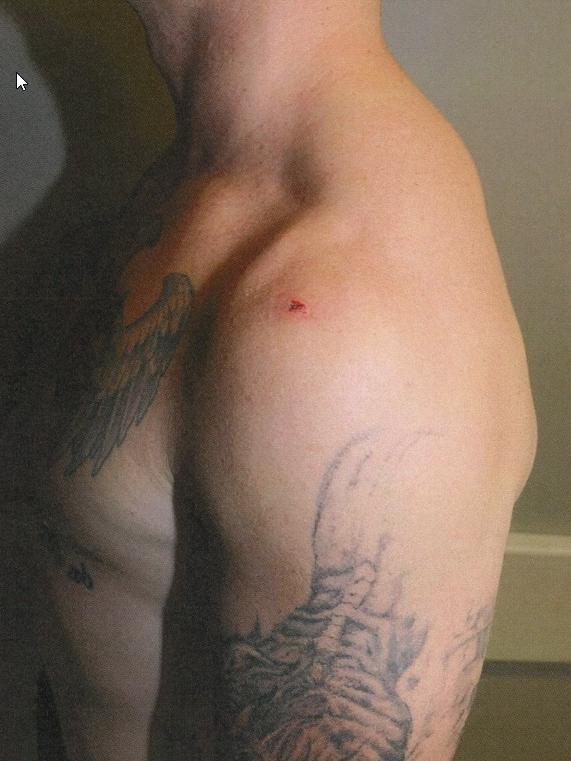
UPDATE TUESDAY 3PM: THE first witness in the trial of NT Police officer Zach Rolfe for the alleged murder of Yuendumu teenager Kumanjayi Walker, fellow cop Robert Kent, has taken the stand.
Under cross examination by Rolfe’s barrister David Edwardson QC on Tuesday, Sgt Kent agreed the expression “blade equals gun” had formed part of his police training.
When asked by Mr Edwardson what the saying meant, Sgt Kent qualified that “it has to be an actual threat” and “there’s an escalation in the use of your firearm as well”.
“There’s different circumstances but if they are actively threatening you with an edged weapon, (the training is) that we should draw our firearm,” he said.
Under further questioning from Crown prosecutor Sophie Callan SC, Sgt Kent elaborated, saying “it depends on the circumstances”.
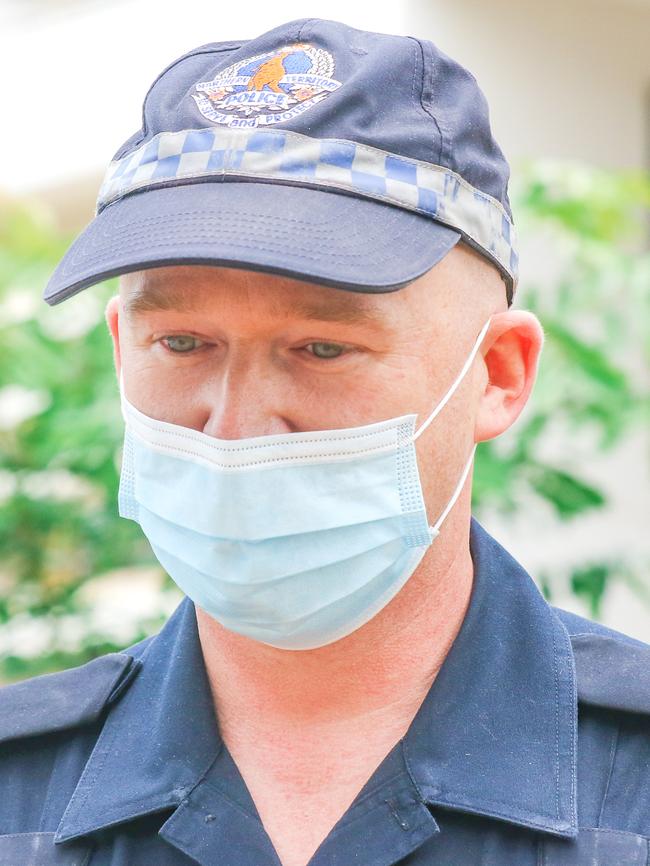
“If a person’s just passively standing there with (an edged weapon), I would be comfortable at a distance having a conversation with them,” he said.
“But if they’re actively threatening me with an edged weapon, then potentially I’d escalate it to drawing my firearm, or giving them some verbal directions first.
“Hand on your firearm is an escalation, drawing your firearm is an escalation, pointing your firearm is an escalation, firing your firearm is again, an escalation.”
Earlier, body worn footage played during the prosecution opening appeared to show Rolfe removing a safety device that would allow a quicker draw of his Glock in the minutes leading up to the fatal shooting.
Under questioning from Ms Callan, Sgt Kent said he would not remove the device on his own firearm until he was in the process of drawing the weapon.
“I would only do it when I’m removing my firearm from my holster,” he said.
“I can’t speak of other people’s training in that regard, but that’s my training.”
Rolfe has pleaded not guilty to all charges and the trial continues on Wednesday.
‘Knife equals gun’: Police truism to ‘loom large’ in Zach Rolfe shooting murder trial
THERE is an axiom in policing circles that “edged weapon equals gun” and that phrase “will loom large” in the murder trial of Territory cop Zach Rolfe over the shooting death of Yuendumu teenager Kumanjayi Walker, a court has heard.
In his opening address to jurors on Tuesday, Rolfe’s lawyer, David Edwardson QC, said his client was “taught, trained and drilled as a member of the NT Police force that edged weapon equals gun”.
“In other words, where a police officer is confronted with an edged weapon, the appropriate response is to draw your weapon and be prepared to use it,” he said.
Mr Edwardson said it would be the defence case that when Rolfe shot Mr Walker three times with his police issue Glock on November 9, 2019, “on each and every occasion, he was acting in good faith”.
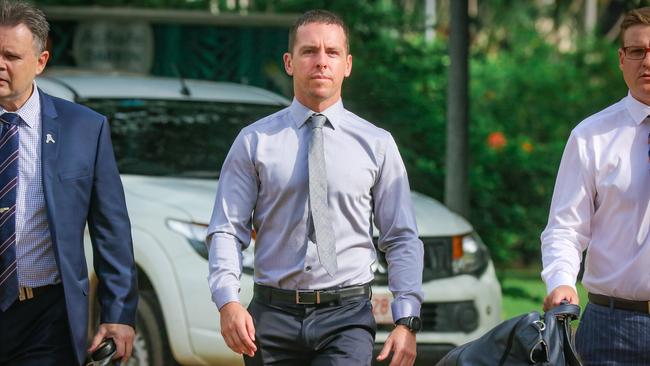
“He was acting in the reasonable performance of his duties and, members of the jury, he was acting in defence of his partner,” he said.
Mr Edwardson said Rolfe and his Immediate Response Team colleagues had been deployed to arrest Mr Walker on the day because “in short, the local Yuendumu police needed help” to arrest the known violent offender.
“At that very moment, Kumanjayi Walker suddenly, without notice deployed a previously hidden pair of surgical scissors and stabbed Constable Rolfe, landing his blow to the shoulder, close to Constable Rolfe’s neck,” he said.
“In the face of that spontaneous attack with an edged weapon, Constable Rolfe was justified in drawing his police firearm and firing a shot into the back of Mr Walker.”
Mr Edwardson said the prosecution had conceded that that shot was an “appropriate defensive action”, with only the second and third shots that were to come the subject of the charges against his client.
“It is the defence position that Constable Rolfe, having been stabbed by a known violent offender, and having lawfully shot him once, was justified in continuing to defend his mate and fellow police officer, who was just doing his job, as was Constable Rolfe,” he said.
“His training required shots to be aimed at his centre body mass to incapacitate, not as Mr Strickland suggested yesterday, to ensure maximum injury or death.
“Zachary Rolfe was entitled to defend himself and defend Constable (Adam) Eberl in the manner he did, notwithstanding the resulting tragic death of Mr Walker.”
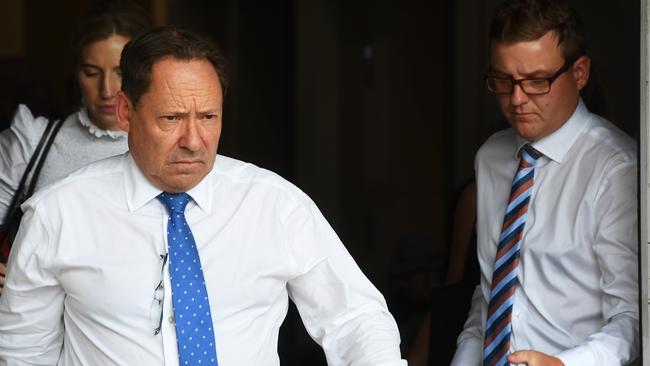
Mr Edwardson urged jurors to leave their emotions at the door and “keep an open mind”, describing the case as one “in which the intellect has to rule the heart”.
“It’s a case where proper scientific evidence needs to inform a calm, rational assessment of the evidence and that’s precisely what you must do,” he said
“Please remember there are two sides to every coin and it is absolutely critical that you don’t rush to judgment in this matter until you have heard all of the evidence.”
Mr Edwardson also encouraged jurors to put any preconceived notions about the case out of their mind, saying the lead up to the trial had seen “unprecedented publicity, with many examples of biased and totally inaccurate reporting”.
“Constable Rolfe is entitled to a trial according to law and what that means is that he is innocent and remains innocent unless and until the prosecution has proven his guilt beyond reasonable doubt,” he said.
“You must ignore whatever you have previously heard or read about this matter and act only on what you hear and see in this courtroom.”
Rolfe has pleaded not guilty to all charges and the trial continues.
Family makes emotional statement
MONDAY 3PM: FAMILY members of Kumanjayi Walker made an emotional statement outside the Supreme Court after seeing video of his death for the first time played in the murder trial of NT Police officer Zach Rolfe.
Speaking outside court, Warlpiri elder Ned Jampijinpa Hargraves said many more of Kumanjayi Walker’s family members would have liked to attend if they had been free to travel from Yuendumu.
“It’s been two years, it’s been two solid years, two much, we are still hurting,” he said.
“We want to see justice, that’s what we want to see.”
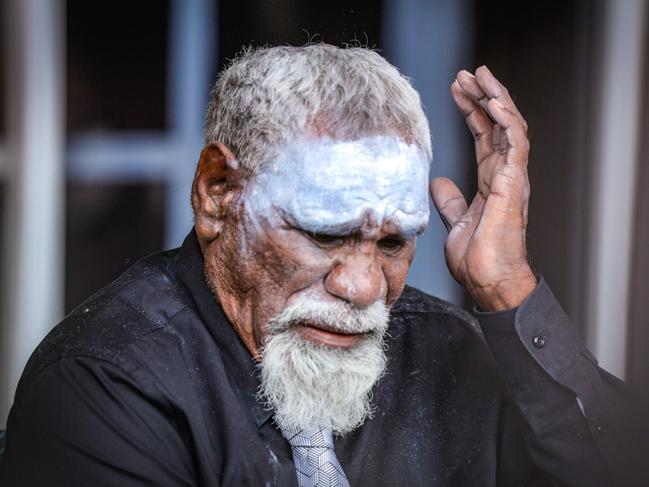
Linsday Japangardi Williams said the community had remained in mourning since Mr Walker’s death more than two years ago while awaiting the trial.
“We have stayed in sorry business, that means we are still grieving the loss of our loved one, Kumanjayi Walker, who was taken away from us at a very young age,” he said.
“During these two years, some of our family members have passed away, we have waited a long time, we’ve travelled a long way, we want justice for our family.”
NT Police Association president, Paul McCue, said the union was pleased the hearing was now under way and looked forward to “ultimately seeing justice prevail”.
“It’s been a very long two years,” he said.
“Obviously from a Police Association perspective, nothing changes for us, we’ll continue to provide ongoing support to Zach and his entire family.
“Police across the country have provided a lot of support from all of my colleagues, through every police union, association across the country.”
Zach Rolfe used a “double tap” technique
THREE gunshots split the desert night in Yuendumu on November 9, 2019.
Soon after, a fatally wounded Kumanjayi Walker is led into the back of a waiting paddy wagon by Constable Zach Rolfe and his police colleagues while the wails of family members ring out in the semi-darkness.
The scene played out in the Supreme Court in Darwin on Monday where jurors in Rolfe’s murder trial were shown the body-worn camera footage of the arrest gone wrong as Crown prosecutor Philip Strickland SC began his opening address.
Mr Strickland then also played body worn camera footage recorded three days earlier, in which an axe wielding Mr Walker is seen advancing on two other officers trying to arrest him after his escape from an Alice Springs rehab facility to attend his great uncle’s funeral.
Rolfe, the court heard, had joined the NT Police in 2016 after serving in Afghanistan with the Australian Defence Force and had “extensive experience in handling firearms and weapons” but “limited experience” in remote policing.
Mr Strickland said Rolfe and four other officers were members of the elite Immediate Response Team, and were armed with shotguns and assault rifles and kitted out in “paramilitary uniforms” when they descended on Yuendumu on November 9.
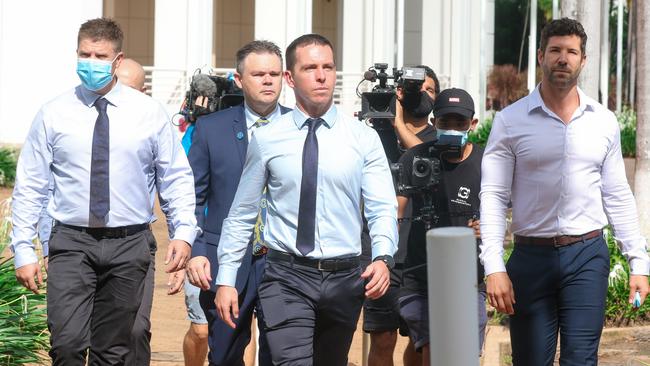
Just before 7pm, the officers entered the house where Mr Walker was located and within “a little over one minute”, Rolfe had fired the first, non-fatal shot at the teenager, while he was holding a pair of 10cm-long medical scissors and struggling with police.
Soon after, Mr Walker and another officer, Constable Adam Eberl, fell to the ground where the struggle continued.
“The Crown case is that Kumanjayi Walker’s right arm was, at that point, pinned under his own body,” Mr Strickland said.
“Now 2.6 seconds after firing the first shot, the accused stood over Kumanjayi Walker while he was pinned down by Adam Eberl and fired again, about 0.5 second after the second shot, the accused fired a third time.”
Mr Strickland said it was the Crown’s case that Rolfe had fired the fatal second and third shots from point blank range as he lay pinned on a mattress on the ground.
“This rapid discharge of shots with a semiautomatic gun is sometimes called a ‘double tap’ in police and military circles,” he said.
“And the double tap is designed to ensure maximum injury or death.”
Mr Strickland was unable to complete his address to jurors before the chief health officer’s four hour “close contact” window was up and will resume when the trial continues on Tuesday.
While the identity of jurors in criminal trials is protected by law, none of the eight men and six women on the panel, including two reserves, is of Aboriginal appearance.
Rolfe has pleaded not guilty to all charges.
Rolfe arrives at Supreme Court
THE trial of NT Police officer Zach Rolfe for the alleged shooting murder of Yuendumu teenager Kumanjayi Walker has begun in the Supreme Court in Darwin.
With jury empanelment under way, representatives of Mr Walker’s family, the Parumpurru (Justice) — Yuendumu Select Committee have requested the co-operation of both the media and public as they deal with the deep trauma and grief stirred up by the trial.
Committee chairman Steven Marshall urged media not to travel to Yuendumu, with representatives of the family present in Darwin to field inquiries.
“This case is important for Warlpiri and the Yuendumu community,” he said.
“We like support from everyone but remember that you need to listen to what we want. We do not want media to come to Yuendumu, and supporters need to follow the protocols we have set.
“This is an important case for all Yapa, but please remember that this is our family member, and it is a hard time for all of us. Don’t make it even harder. Thank you.”
Yuendumu community elder, Robin Japanangka Granites, urged journalists to treat mourning relatives with respect throughout the proceedings.
“It’s good that we want media to be spreading our message, so the people outside who don’t know, our culture and history, can learn and understand,” she said.
“(But) you need to introduce yourself and explain so we know who you are,” she said.
“There are family representatives in Darwin, and the media needs to talk to them with respect.
“In our culture we are in sorry business. We are Warlpiri people and we speak Warlpiri language.”
After a 14 person jury is selected, including two reserve jurors, Justice John Burns will prep them for the trial before the prosecution makes its opening address.
Rolfe heads to court
NT POLICE officer Zach Rolfe will start to learn the full extent of the evidence against him when his trial begins in the Supreme Court on Monday — two years after he was charged with murder.
A panel of 12 men and women, plus two reserve jurors, will sit in judgment over the shooting death of 19-year-old Kumanjayi Walker during an arrest gone wrong in Yuendumu in 2019.
Covid protocols mean Rolfe will likely take up his seat in the public gallery, behind his legal team, while jurors are split between the traditional jury box and the accused person’s dock.
The trial was originally scheduled to go ahead last year but a last-minute appeal on a point of law which travelled all the way to the High Court has delayed proceedings until now.
With special Covid measures in place for the duration of the trial, Rolfe’s fate, along with closure for Mr Walker’s family, depends on the Territory’s current outbreak being held at bay and out of the courtroom for the next three weeks.
With jury selection due to begin from 10am, the first witness is likely to be called before lunch when it is anticipated jurors will retire for the day to avoid becoming defined as close contacts with each other should any of them test positive.
Any legal arguments will then be taken up by the parties’ lawyers after the break, with jurors expected to retake their seats in the courtroom on Tuesday morning.
The move is designed to ensure the jurors do not spend more than four hours together on any given day, in line with chief health officer directions that would then require them each to isolate for seven days if any one of them returns a positive test.
Prosecutors have previously told the court 150 rapid antigen tests will be on standby from day one of the trial to facilitate regular testing for jurors.
Rolfe has already formally entered a plea of not guilty to the murder charge as well as to alternative charges of manslaughter and committing a violent act causing death.
For full, rolling coverage of the trial as it unfolds, stay tuned to ntnews.com.au



